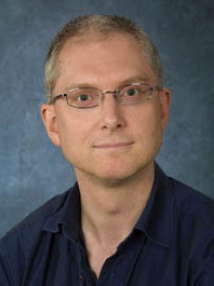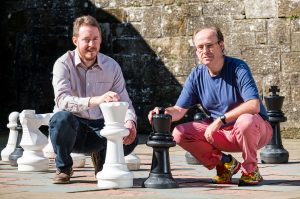Dr Tom Kelsey will be an expert panel member for the launch event on the future of artificial intelligence and machine learning held at the London Marriott Hotel, November 2018.
AI
Fable-based Learning: Seminar by Prof Jimmy Lee
CUHK + UniMelb = Fable-based Learning + A Tale of Two Cities
Prof Jimmy Lee, Chinese University of Hong Kong
This talk reports on the pedagogical innovation and experience of a joint venture by The Chinese University of Hong Kong (CUHK) and the University of Melbourne (UniMelb) in the development of MOOCs on the computer science subject of “Modeling and Solving Discrete Optimization Problems”. In a nutshell, the MOOCs feature the Fable-based Learning approach, which is a form of problem-based learning encapsulated in a coherent story plot. Each video lecture begins with an animation that tells a story based on the Chinese classic “Romance of the Three Kingdoms”, in which the protagonists in the novel encounter a problem requiring technical assistance from the two professors from modern time via a magical tablet bestowed upon them by a fairy god. The new pedagogy aims at increasing learners’ motivation as well as situating the learners in a coherent learning context. In addition to scriptwriting, animation production and situating the teaching materials in the story plot, another challenge of the project is the remote distance and potential cultural gap between the two institutions as well as the need to produce all teaching materials in both (Mandarin) Chinese and English to cater for different geographical learning needs. The MOOCs have been running recurrently on Coursera since 2017. Some learner statistics and feedbacks will be presented. The experience and preliminary observations of adopting the online materials in a Flipped Classroom setting at CUHK will also be detailed.
This video at Youtube shows the trailer for the Coursera Course:
Biography:
Jimmy Lee has been on the faculty of The Chinese University of Hong Kong since 1992, where he is currently the Assistant Dean (Education) in the Faculty of Engineering and a Professor in the Department of Computer Science and Engineering. His major research focuses on constraint satisfaction and optimization with applications in discrete optimization, but he is also involved in investigating ways of improving students’ learning experience via proper use of technologies. Jimmy is a two-time recipient (2004 and 2015) of the Vice-Chancellor’s Exemplary Teaching Award and most recently the recipient of the University Education Award (2017) at CUHK.
Event details
- When: 21st August 2018 13:30 - 14:30
- Where: Cole 1.33b
- Format: Seminar
Seminar: SMT, Planning and Snowmen
Professor Mateu Villaret, from Universitat de Girona is a visiting scholar with the AI group from July 1st until September 30th. Professor Villaret works on algorithms for routing and scheduling with the AI group at St Andrews.
As well as solving practical problems, he also enjoys puzzle games. That is the basis of this talk, about using Planning and SMT to solve the “Snowman” puzzle.
Event details
- When: 6th August 2018 11:00 - 12:00
- Where: Cole 1.33a
- Series: AI Seminar Series
- Format: Seminar
Seminar: AI-augmented algorithms — how I learned to stop worrying and love choice
The speaker is Lars Kotthoff, previously a PhD student here, now and Assistant Professor at the University of Wyoming. All welcome.
Often, there is more than one way to solve a problem. It could be a different
parameter setting, a different piece of software, or an entirely different
approach. Choosing the best way is usually a difficult task, even for experts.
AI and machine learning allow to leverage performance differences of
algorithms (for a wide definition of “algorithm”) on different problems and
choose the best algorithm for a given problem automatically. In AI itself,
these techniques have redefined the state of the art in several areas and led
to innovative approaches to solving challenging problems.
In this talk, I will give examples of how AI can help to solve challenging
computational problems, what techniques have been applied, and how you can do
the same. I will argue that AI has fundamental implications for software
development, engineering, and computer science in general — stop making
decisions when coding, having more algorithmic choices is better!
SRG Seminar: “Interactional Justice vs. The Paradox of Self-Amendment and the Iron Law of Oligarchy” by Jeremy Pitt
Self-organisation and self-governance offer an effective approach to resolving collective action problems in multi-agent systems, such as fair and sustainable resource allocation. Nevertheless, self-governing systems which allow unrestricted and unsupervised self-modification expose themselves to several risks, including the Suber’s paradox of self-amendment (rules specify their own amendment) and Michel’s iron law of oligarchy (that the system will inevitably be taken over by a small clique and be run for its own benefit, rather than in the collective interest). This talk will present an algorithmic approach to resisting both the paradox and the iron law, based on the idea of interactional justice derived from sociology, and legal and organizational theory. The process of interactional justice operationalised in this talk uses opinion formation over a social network with respect to a shared set of congruent values, to transform a set of individual, subjective self-assessments into a collective, relative, aggregated assessment.
Using multi-agent simulation, we present some experimental results about detecting and resisting cliques. We conclude with a discussion of some implications concerning institutional reformation and stability, ownership of the means of coordination, and knowledge management processes in ‘democratic’ systems.
Biography

Jeremy Pitt is Professor of Intelligent and Self-Organising Systems in the Department of Electrical & Electronic Engineering at Imperial College London, where he is also Deputy Head of the Intelligent Systems & Networks Group. His research interests focus on developing formal models of social processes using computational logic, and their application in self-organising multi-agent systems, for example fair and sustainable common-pool resource management in ad hoc and sensor network. He also has strong interests in human-computer interaction, socio-technical systems, and the social impact of technology; with regard to the latter he has edited two books, This Pervasive Day (IC Press, 2012) and The Computer After Me (IC Press, 2014). He has been an investigator on more than 30 national and European research projects and has published more than 150 articles in journals and conferences. He is a Senior Member of the ACM, a Fellow of the BCS, and a Fellow of the IET; he is also an Associate Editor of ACM Transactions on Autonomous and Adaptive Systems and an Associate Editor of IEEE Technology and Society Magazine.
Event details
- When: 15th November 2017 13:00 - 14:00
- Where: Cole 1.33a
- Series: Systems Seminars Series
- Format: Seminar
n-Queens Completion is NP-Complete
Update, 2021
Over the years since we published this research, many people have approached us having solved the n queens puzzle, either for one n like 8 or 1000, or having written an algorithm to solve it for different sizes. Unfortunately this is not a major result in Computer Science and does not make one eligible to claim the $1M Clay prize. Many have been disappointed by this so we want to clarify why this is the case.
It is true that work on this problem could potentially result in the award but only if some exceptionally difficult conditions are met.
- EITHER prove mathematically that NO possible algorithm could solve the n queens completion problem in polynomial time;
- OR prove that there is an algorithm which is guaranteed to solve every instance of the n queens completion problem in polynomial time. Note that in this case the algorithm has to work on the completion version of the problem studied in our paper, not placing queens on an empty board; the algorithm has to give the correct answer on every possible instance given to it; and there has to be a mathematical proof that the algorithm’s runtime is bounded above by some polynomial in the size of the board. However fast a given algorithm runs when tested, this is not sufficient because there are an infinite number of possible tests available, so a mathematical proof is required.
- AND in either case, prove this at a level that is published in a respected academic source and is widely accepted by research experts as correct.
We are delighted that our work has led so many people to be interested in the problem of solving problems like the n queens puzzle that fascinates us. But we also apologise for any impression we gave, unintentionally, that a solution to the n queens puzzle could lead to the award of the prize except under the extremely strenuous conditions listed above.
Ian Gent, 10 May 2021
Original Post from 2017:
Ian Gent, Christopher Jefferson and Peter Nightingale have shown that a classic chess puzzle is NP-Complete. Their paper “Complexity of n-Queens Completion” was published in the Journal of Artificial Intelligence Research on August 30, 2017.

Peter Nightingale and Ian Gent at Falkland Palace, Wednesday, 17 August 2017.
©Stuart Nicol Photography, 2017
controversy in Artificial Intelligence (AI). The n-Queens puzzle is often used as a benchmark problem, but good results on the problem can always be challenged because the problem is so simple to solve without using AI methods.
The new work follows a challenge on Facebook on New Year’s Day, 2015, when a friend of Ian’s asked him how hard n-Queens is if some queens were already placed on the board. It turns out, this version (dating from 1850) of the puzzle is only two years younger than the more famous n-Queens problem. The picture shows Peter (left) and Ian (right) with queens on the board at positions suggested by Nauck in 1850, the squares b4 and d5. Can you put another 6 queens on the board so that the entire board is a solution of 8-Queens? The general version with some number of queens preplaced on an n by n board is the n-Queens Completion puzzle.
Seminar: Propagation and Reification: SAT and SMT in Prolog (continued)
Jacob Howe, City University, London
Event details
- When: 23rd June 2017 13:00 - 14:00
- Where: Cole 1.33a
- Series: AI Seminar Series
- Format: Seminar
Success in the Laidlaw Undergraduate Internship Programme in Research and Leadership
Congratulations to Patrick Schrempf and Billy Brown who have been successful in their applications for a Laidlaw Undergraduate Internship in Research and Leadership for 2017. You can read further details about Billy and Patrick below.
Billy Brown:
 I’m a fourth year Computer Science student from Belgium with too much interest for the subject. I play and referee korfball for the university, and I am fascinated by Old English and Norse history and mythology. I plan on using the Laidlaw Internship programme to get into the field of Computer Science research.
I’m a fourth year Computer Science student from Belgium with too much interest for the subject. I play and referee korfball for the university, and I am fascinated by Old English and Norse history and mythology. I plan on using the Laidlaw Internship programme to get into the field of Computer Science research.
Project summary:
The Essence Domain Inference project aims to improve automated decision making by optimising the understanding of the statements used to define a problem specification. As part of the compilation of the high level Essence specification language, this project would tighten the domains to which a specified problem applies, with a domain inference algorithm.
The work is very much in the context of the recently-announced EPSRC grant working on automated constraint modelling in an attempt to advance the state of the art in solving complex combinatorial search problems. The modelling pipeline is akin to a compiler in that we refine a specification in the Essence language Billy mentions down to a number of powerful solving formalisms. The work Billy plan is to improve the refinement process and therefore the performance of the solvers, leading to higher quality solutions more quickly.
Patrick Schrempf:
 I am currently a third year Computer Science student from Vienna. After enjoying doing research with the St Andrews Computer Human Interaction (SACHI) group last year, I am looking forward to the Laidlaw Internship Programme. Apart from research and studying, I enjoy training and competing with the Triathlon Club and the Pool Society.
I am currently a third year Computer Science student from Vienna. After enjoying doing research with the St Andrews Computer Human Interaction (SACHI) group last year, I am looking forward to the Laidlaw Internship Programme. Apart from research and studying, I enjoy training and competing with the Triathlon Club and the Pool Society.
Continue reading
Funded PhD Research Studentship in Constraint Programming
Dr Chris Jefferson at the School of Computer Science is offering funding for a student to undertake PhD research in Constraint Programming.
He is looking for a highly motivated research student with an interest in Artificial Intelligence and Algorithms. The studentship offers costs of fees for UK or EU students and an annual tax-free maintenance stipend of about £13,726 per year for 3.5 years. It might also be possible to fund non-EU students on an equivalent basis, so students of any nationality are encouraged to apply. Students should normally have or expect at least an upper-2nd class Honours degree or Masters degree in Computer Science or a related discipline.
Research topics of interest to Dr Jefferson include the automatic generation of propagation algorithms (http://caj.host.cs.st-andrews.ac.uk/pubs/statelessprop.pdf), the automated creation of combinatorial puzzles (http://caj.host.cs.st-andrews.ac.uk/pubs/combination.pdf), or advances in Computational Group Theory. Dr Jefferson is also interested in any student suggested projects in the area of Constraint Programming.
For further information on how to apply, see our postgraduate web pages (http://www.cs.st-andrews.ac.uk/prospective-pg).
Candidates should address general queries to pg-admin-cs@st-andrews.ac.uk, or specific queries on the research topics to caj21@st-andrews.ac.uk. The application process will require an interview (by phone or voice-conference if appropriate).
The closing date for applications is June 5th 2014 and we aim to make decisions on studentship allocation by June 20th 2014.


